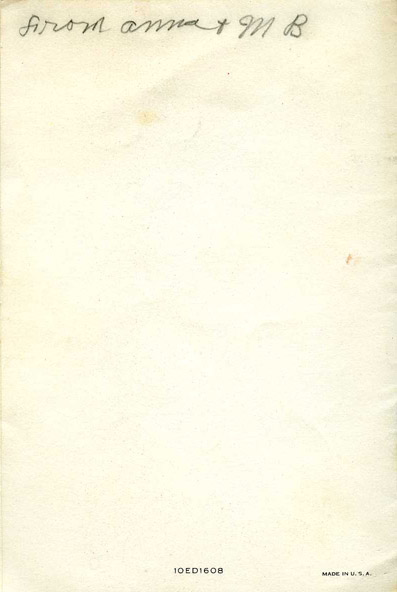I unfortunately don't know alot of the
details about Manley's cowboy days before he married my grandmother.
Manley was thirty-five when on October 16, 1922 he married Anna Ellen
Vogt, a widower with three grown children who would become my mom's
step-brothers and sister.
Mom was the only child of Anna and Manley
and with his new family the quiet but tough-as-nails cowboy probably
had some adjusting to do after his lengthy bachelorhood. But his little
Betty Ann was the apple of his eye and I know he would have done anything
for her.
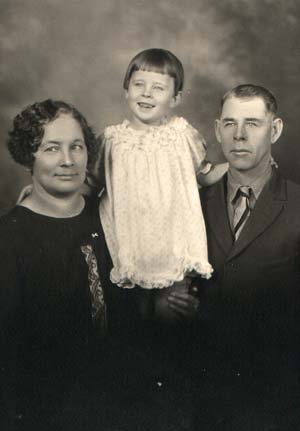
Anna, Betty and Manley
Barr, ca. 1926
I think Manley merged his new family
life with what he always loved and therefore he continued to raise
horses after he was married. Prior to WWI he sold a number of horses
to the Army. After WWI he continued to raise horses, although the
US Army's cavalry and horse platoons no longer needed horses as they
were moving to be a more mechanized military.
I can remember my dad later saying that
Manley probably stayed too long in the horse business and that it
contributed to his loss of their ranch during the Great Depression.
In cleaning out an old desk I recently
found a card advertising a closing out sale of breeding stallions.
I don't know the date of this event or if it had anything to do with
when my grandparents lost their River Ranch in Elba, Nebraska (Howard
County) around 1933. This sale was in York and probably involved the
family ranch in York. But the high quality of the stallions for sale
on the card matches what I had heard about his appreciation for good
horses. It also called to mind a line I read in his obituary that
said "Mr. Barr...had a great admiration and knowledge of horses."
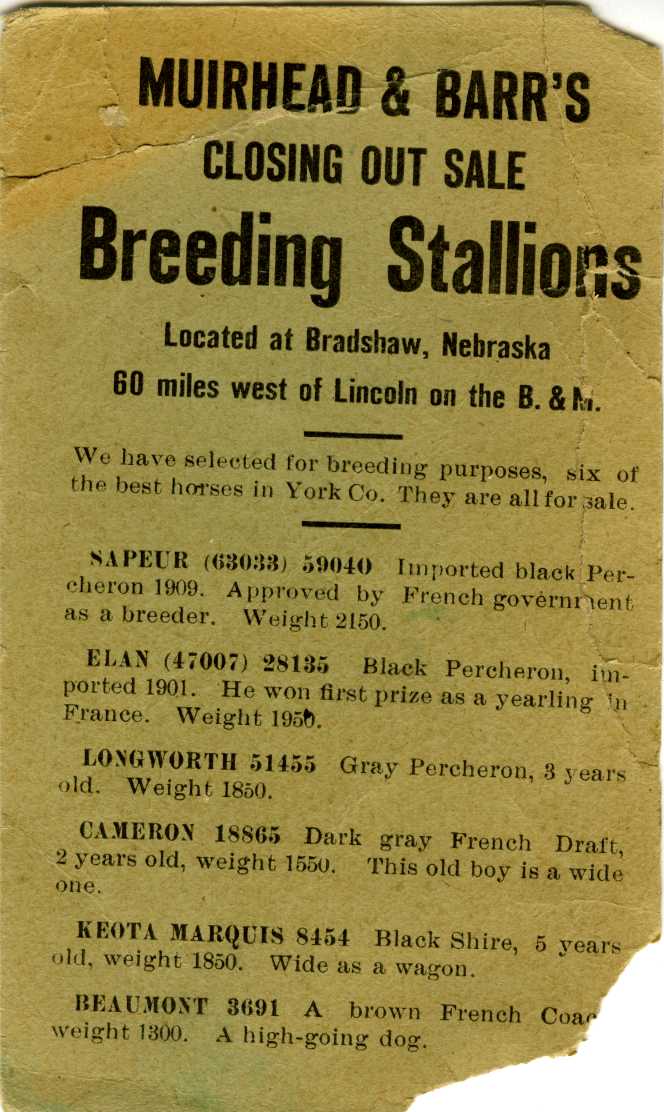
This closing out sales card also became
a trigger for my own memories of my grandfather in the 1950's and
early 60's and specifically the hours I spent with him each August
when he would come to visit us in Lincoln. Those visits always included
a full day at the Nebraska State Fair for just my grandpa and me where
we would go to the horse barns and the exhibition hall where we could
sit and watch the horses and their riders display their talents.
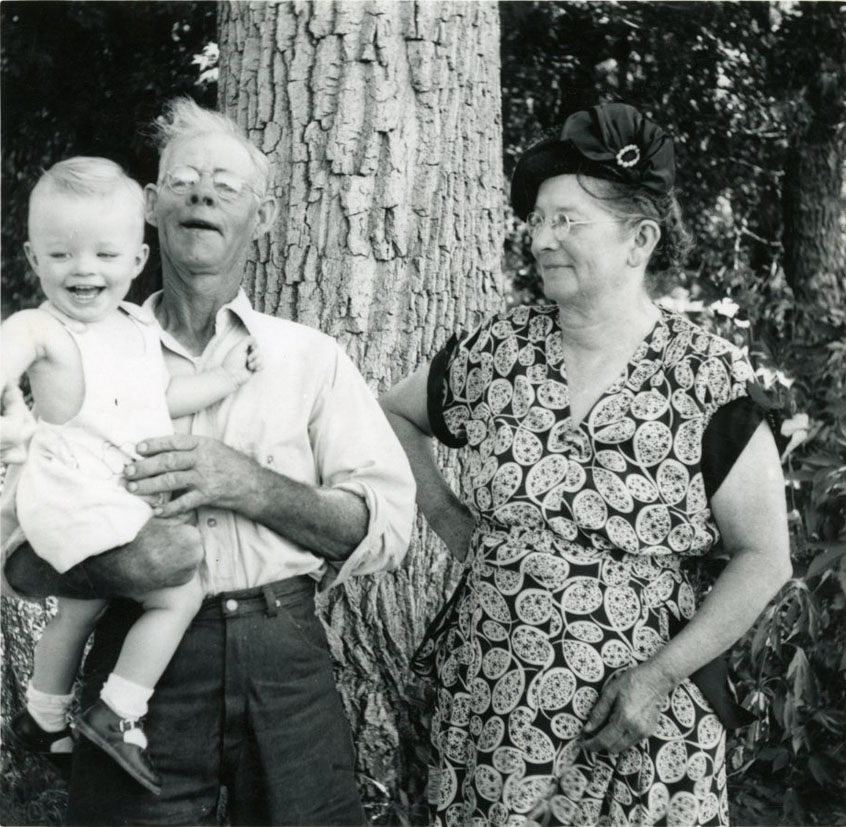
Doug, Grandpa and Grandma
Barr, 1951

Elba Farm ca.1953
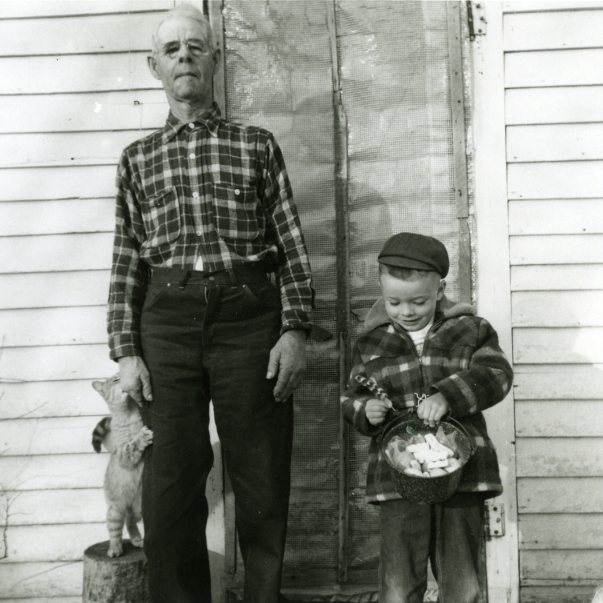
Easter, ca.1957
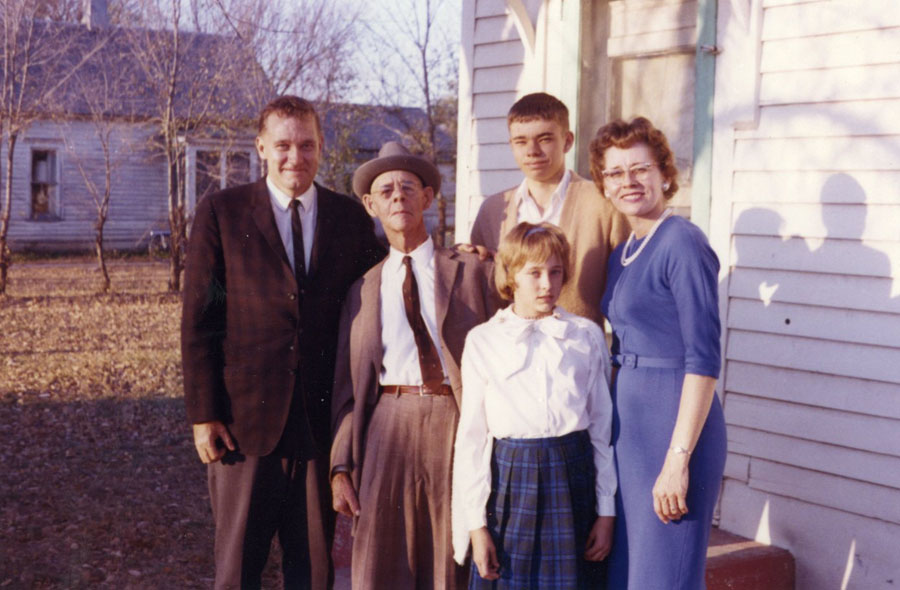
July 1965
I always looked forward to the Nebraska
State Fair and can still re-create our State Fair itinerary from memory.
Grandpa Barr was a man of few words but he probably talked more with
me at the State Fair than any other time I can remember.
In comparison, it would be interesting
to know how much he talked to horses, whether on the range, at his
ranch or at the State Fair. My guess is that there was considerable
communication through the years between Grandpa Barr and horses.
Three vivid memories are still associated
with my Nebraska State Fair outings with Grandpa Barr.
At the end of August and the first
week in September during fair time it could be 100° F and I remember
it always was humid. A Hires Root Beer in a frosty mug was a must
stop. We visited the same root beer stand each year (it was just up
the street from the main Agricultural Hall) and it gave us a break
from the horse barns, 4-H riding exhibitions and other farm related
exhibitions found at that same end of the fairgrounds.
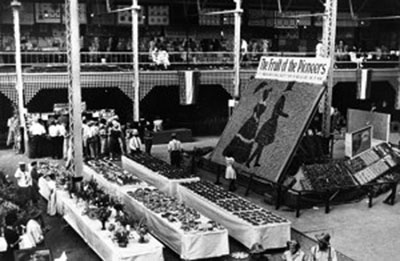
Industrial Arts Building,
ca. 1950's, Apple mosaic The Fruit of the Pioneers, courtesy
Lincoln Journal-Star
Another must stop was the Grace Methodist
Church food stand were we would eat homemade cherry or apple pie or
St. James Methodist's food stand, our other pie palace. King's had
a stand where we would normally eat our favorite hamburger but Grandpa
Barr loved pie. I can remember he would have pie for breakfast when
he would visit us and also telling me that when he went to school
his favorite lunch was a slice of bread spread with lard or a piece
of pie.
Walking the fairgrounds, watching tractor
pulls and inspecting farm machinery, looking at the pigs, chickens,
jams and quilts, the vendors selling their veg-o-matics, and going
to the Industrial Arts Building to see the apple art mosaic (new each
year) were all standard activities. But root beer and pie and Kings
were staples for keeping up our energy.
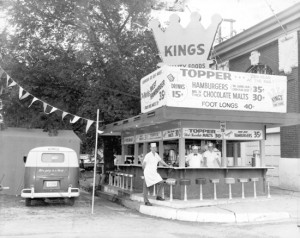
My third memory of Grandpa Barr and
the State Fair was walking with him on the midway and spending extra
time at the end of the midway where a Hoochy
Kootchy show was located. I can remember the mystery that I felt
as a young boy wondering what went on inside that tent. Also a little
guilt as I was thinking my mom shouldn't probably know that we spent
any time observing the promotional acts outside that exhibit.
I did at one point go inside the penny
arcade on the midway and view the 'shapely pin-ups." All I saw
through its peephole, however, after putting in my coin was a light
going on and a row of clothespins in various colors.
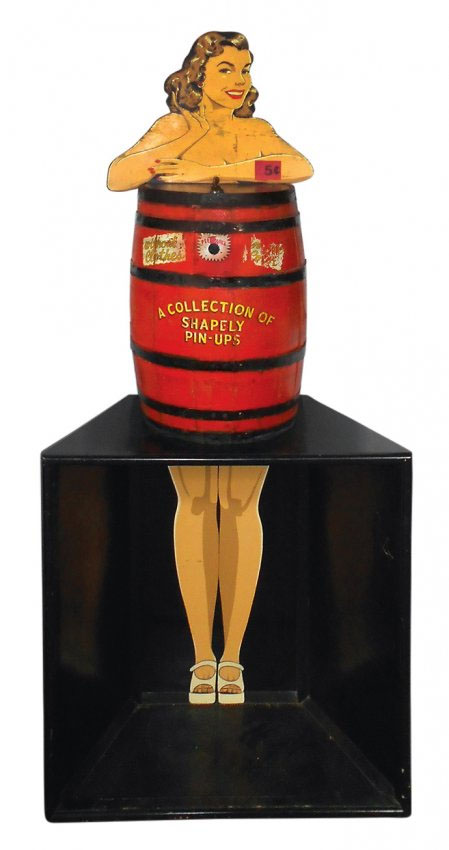
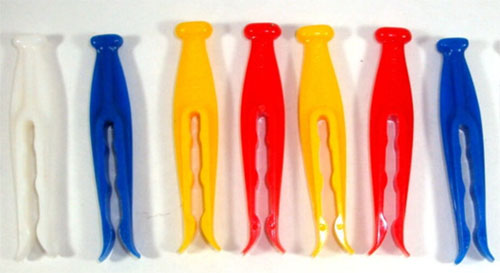
What else do I remember
about Grandpa Barr?
Grandpa Barr had one phrase
when we played pitch that was never fully resolved as to the exact
limits of his words: When cutting the deck he would say "Cut
'em thin, sure to win." I think 'house rules' ultimately
decided that it had to be at least two cards that were part of the
cut. But if you were unitiated to our card table, it probably
seemed a somewhat controversial, albeit good-humored, tactic.
He had a single light bulb
hanging from the ceiling over his bed and there was a string attached
to it that he could reach while laying in bed to turn it on or off.
When he peeled potatoes
he would sit in his captain's chair in the middle of the kitchen and
bend over a bucket where the peelings would fall into. No garbage
disposal, of course, so the peelings would then go into his compost
heap behind his house.
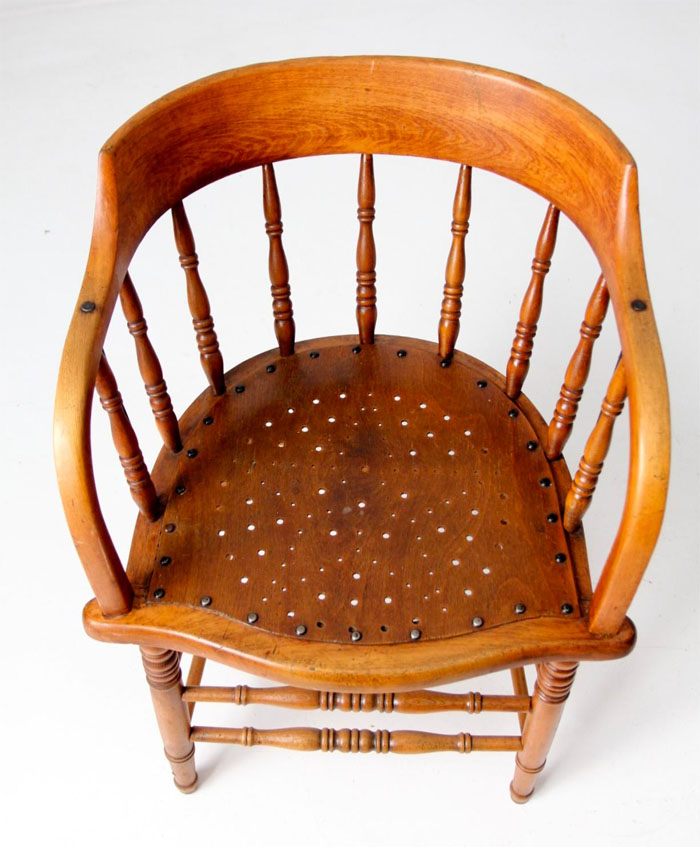
He liked Kellogg's Corn Flakes or oatmeal
for breakfast. Because of a farm accident he was missing three fingers
on his right hand so he would hold a sugar spoon with that hand (not
really able to grip it) and use his left hand to tap his right hand
to sprinkle the sugar on his cereal. It was a morning ritual.
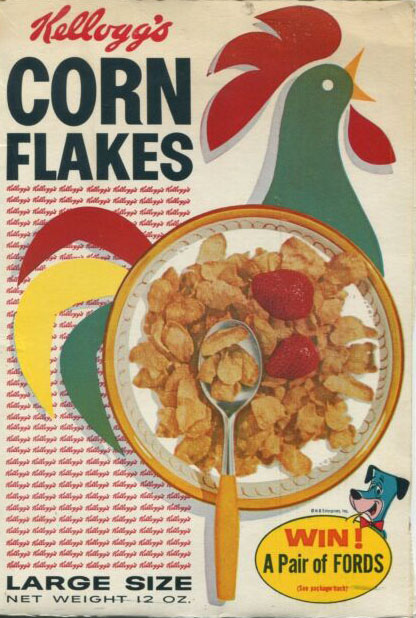
1960 Box of Kellogg's
Corn Flakes

Kellogg's Toasted Corn
Flakes, Ladies' Home Journal, May 1913
But in the end, two phrases stand out
when I think of Grandpa Barr.
The first one was normally heard when
playing pitch and he urged me to "Bid 'em high and sleep in
the streets." He loved playing cards and it was a phrase
encouraging me to not be afraid of going set if I thought my cards
looked like they had some potential. He certainly wasn't a river boat
gambler but perhaps this phrase was also my grandpa giving me broader
advice to take some chances in life.
In contrast, his other phrase seemed
humorously cautionary and would be used when it was time for us to
go home. He'd look me in the eyes and then say "Good-bye and
don't take any wooden nickels." The "don't take any
wooden nickels" phrase is believed to have started in the United
States at the beginning of the twentieth century when it was given
as advice to be wary of being taken advantage of by unscrulpulous
people, particularly by those in the big city. This belief that those
living in the country might be naive in the ways of the big city probably
resonated with many of that era. But that belief wasn't something
new and differences between the city and country lifestyles and morals
have been a popular culture belief for countless generations with
examples told in stories going back to at least the 6th century BCE
with Aesop's Fable "The Town Mouse and the Country
Mouse."
The contrast between city and country
life was also a popular comedy routine in early phonograph recordings
such as in the stories told by Cal Stewart's Uncle Josh Weathersby
who lived in rural Punkin' Centre. (Listen to Uncle Josh's visit to
New York City on his 1902 Edison Record "Uncle
Josh and the Bunco Steerers" and "Uncle
Josh Weathersby and the Lightening Rod Agent" (where Uncle
Josh gets "Buncode agin, by Chowder!") as examples of this
theme.
Read Smithsonian's article "A
Brief History of the Nickel" for more details about the United
States nickel).
For a phonograph connection with wooden
nickel/wooden money see wooden
nickel.
"Bid 'em high and sleep in the
streets."
"Good-bye and don't take any wooden
nickels".
Classic Grandpa Barr!

To learn more about Grandpa Barr see
my mom's story My
Dad, Manley Miller Barr
Footnote 2023
When you're a collector you seek and
and keep things intentionally. When you are cleaning up your parents
house (where they lived for over fifty years) you find things you
weren't looking for.
The following card is one of those
items I came across when going through some of the greeting cards
mom kept and I'm adding it as a footnote. It's disproportionate
in the prominence it gets by being on this page (even if I call
it a footnote), but mom must have found it amusing and she kept
it.
I'm pretty sure it was a birthday
card Manley sent to Axel circa 1958 and it was signed on the back
by Manley as "From Anna & MB" (Manley Barr). Not a
card I would have expected from my grandma to her son-in-law.
I'm guessing Grandma Barr asked Manley
to get a card in the mail to Axel and this is what he chose.
Grandma Barr probably didn't see what
MB sent.
Or maybe she did, and smiled.
